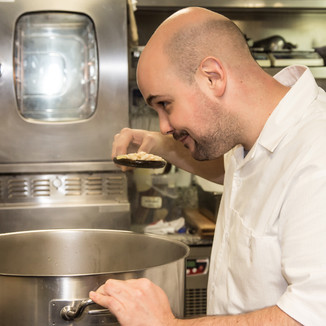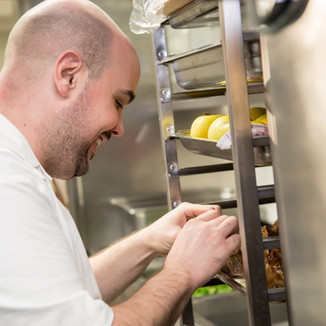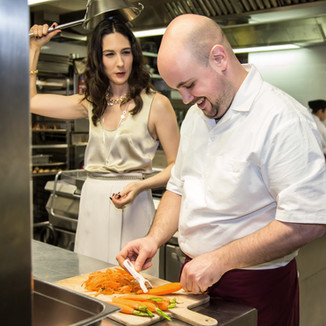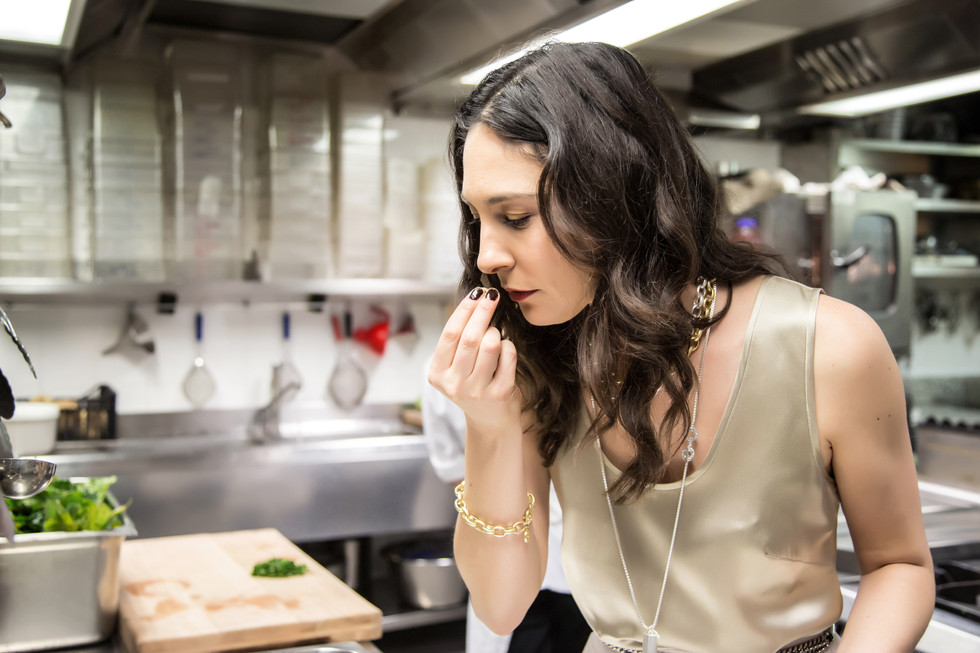Chris Behr: An American in Rome
- Melissa Lupo

- Feb 1, 2016
- 9 min read
Updated: Feb 10, 2024
"If you work at a restaurant and the staff meal is terrible, find another job. If you don’t take care of your family, you don’t take care of your guests."
American Chef Chris Behr is a great example of what can happen when you do what you love to the max. Chef life can be tough, working long hours with low pay in crazy conditions. While the reward of creation is sweet, this lifestyle can deter some people from following that dream. But sometimes you have to go rogue - to do what you love and to have the audacity to do it on your terms.
A former client now friend, it's impossible not to be carried away by Chris's enthusiasm, and stepping onto the grounds at the American Academy in Rome, home of the Rome Sustainable Food Project (RSFP), an Alice Waters project, it was easy to see why. A seasoned chef with experience working in the best kitchens in the U.S., Chris has paid his dues but never lost his passion, making each new experience better, more rewarding, and on his terms.
CGC: What is an American chef doing in Italy?
Well when I was Chef de Cuisine at SPQR in San Francisco in 2012, Nate Appleman, Executive Chef of A16 left the restaurant group to go to New York so a bunch of us followed him to open a huge restaurant called Pulino's on the Bowery, a Keith McNally venture, but it didn't work out.
Long story short, we opened up a seasonal italian restaurant, everyone was behind it, the first season turned, and everyone complained when we took tomatoes out of the salad. We were supposed to be doing a seasonal menu but McNally's sentiment was that if his million dollar investors wanted tomatoes in their salad and if you can buy it at Whole Foods across the street, put fucking tomatoes in the salad.
I worked for him at his other restaurants like Balthazar and I can't really fault him, it's just not what he does, his restaurants are more about the experience. So we all left and I found myself at Franny's and as the Chef at The Brooklyn Larder in Park Slope. In April 2012 I was teaching a class with my friend Tamar Adler who is a writer for the New York Times Magazine who wrote a book about sustainable cooking and Mona Talbott was in the class, the founding chef of the RSFP.
That day we had all the students bring in the weirdest stuff they could find in their fridge and we Iron Chef'd a huge meal, taking what was a few steps away from garbage, and making it into a huge feast. Mona was really impressed with what I had to say which was basically, if you work at a restaurant and the staff meal is terrible, find another job. If you don’t take care of your family, you don’t take care of your guests.
Afterwards she came up to me saying, "you're speaking my language and we need a sous chef in Rome." It was in front of my co-workers and my sous chef said to me, "Chris, if someone offers you a job in Italy, you take it." I planned to move there in three months but three days later I get a call from Rome saying that the current chef had just broke his ankle, asking me if I come that weekend.
"...sometimes you have to go rogue, to do what you love and to have the audacity to do it on your terms."
CGC: How is working in the kitchen at the academy different from working in a regular restaurant kitchen?
CB: First of all this is a not-for-profit, so I'm not worried about the bottom line. It's a teaching kitchen, based on free intern labor and it's also a closed community, we're feeding the same 50 people every day. If you have different customers you can serve the same asparagus every day but all my customers are regulars so it's a challenge, especially since we're sustainable, I can't serve the same thing I served the day before, I have to reinvent it, to make it interesting for us to cook, for someone to eat, and an opportunity to learn. Rarely does stuff go in garbage or compost.
Also, the location...
While most kitchens are held together by duct tape and stress, we have a gorgeous view out the window, we grow a lot of our own food, and we pay our service guys, a lot of them from Eritrea, a real wage.
Most kitchens are learning because they have to be, if I have a bit of time to teach I will take it. In a restaurant kitchen you are out after the first time you mess up, here you make a mistake, you are learning, this is a safe place. Also, we live here, if someone is late for work I go and bang on their door.
CGC: What would you say is a misconception Americans have of Italian cuisine?
CB: The misconception that assuming Italian american food is actually eaten here. For instance, the classic example of spaghetti and meatballs, this is actually served as two separate dishes. Also if you ask any American if Italian food has a lot of garlic, they're like "oh yeah" but actually...Italians do NOT like a lot of garlic and onions, and it has everything to do with digestibility, which Americans don't even have a vocabulary for. Like, my co-workers spend the first 30 mins at the bar talking about what they digested, how they digested yesterday, how digestable the food was today, which explains the overcooked meat and pasta in bianco (plain pasta with butter or olive oil) that my co-workers eat every day at lunch.
CGC: What is a misconception Italians have of American cuisine?
CB: Hm. Well that is tough because I feel like all of their exaggerated misconceptions are mostly true. Ask the average Italian what Americans eat and they'll say cheeseburgers every day and well, they're not that wrong. Even if 100% don’t eat cheeseburgers every day, at least 50%-60%, do. I would say that the one thing Italians don't understand is the Alice Waters Cal-Italian way, the lighter fare that's more similar to the Mediterranean diet. But yeah, I think they kind of have America pegged with their nutrition-less white bread, bigger is better mentality, with pizza and chicken nuggets every day.
CGC: What about the Italian cuisine could be improved?
CB: If it could go back to the way it was 50-60 years ago, that would improve it. Italians are going America. They’re going to supermarkets because it's one stop-shopping because they're working longer hours, making less money, and have less time. Smaller producers are getting run off the map. Also I've seen portion sizes go through the roof. I went to a restaurant the other day and was served 200g of pasta. Portion sizes are going up and quality is going down. In my four years I've seen the farmer's markets dying. Convenience has trumped everything else, they've forgotten everything from the past 40 years. Everything is becoming less neighborly.
CGC: What can Americans learn about the Italian way of cooking and life in general?
CB: Well after living in New York my first thought was WHY IS EVERYONE MOVING SO SLOW. It took seriously over a year to get over the social anxiety of everything taking so long. The same reason I love it is the same reason I hate it. You want the bus, you gotta wait, you want a stamp, you gotta wait. But you learn to stop and smell the roses, there’s a lot to take away from learning how to slow down and enjoy your coffee. Italians have the work-life balance figured out and Americans are so bad at it. I used to send emails at midnight on a Friday and expect an answer right away. Now I know I'm not going to hear anything back until Monday morning around 10:30am.
CGC: You’re in your chef whites a lot but has living in Italy influenced your personal style?
CB: Yeah for sure. I was either in chef whites or pajamas before and what italy has taught me is that I’m usually the worst dressed guy in the room. Italians take much more care, and I appreciate it. I mean no one cruises out to the store in pjs and socks. It might take longer but they look better, there is a little bit of extra care in everything. Now I take 10 more minutes to get ready and look ready to be in the world. I rarely see disheveled Italians, I think it's part of that stop and smell the roses thing. If you're in a bar and see someone in cargo pants and sandals it's usually an American.
CGC: Do you have any personal accessories you didn't have before, I personally love men in accessories. Italian men might often be seen carrying bags or purses...or as Americans refer to them, a murse. (man + purse = murse).
CB: Before Italy I was the guy in cargo pants because I liked the storage but now I've changed it up. Also I’m a little more in tune to the breeze. I have my gloves, scarf, hat, especially since I’m on a motorino. I'm thinking about these things a little more, I mean it's not like the punch of air is going to hurt my kidneys but now I'm just more prepared for the cold and wet whereas in San Francisco I was in a t-shirt and hoodie. I'm realizing that layering is important.
CGC: If Milan is Italy’s fashion capital, Rome is the city of cinema, does this play into your everyday experience at the academy?
CB: We’re at the highest place in Rome so a lot of movies are shot here, also the Tiber river is just down the road. They were shooting Spectre 007 here recently and for weeks there were helicopters everywhere as they were shooting the chase scene. For a while they had an 18-wheeler parked outside the academy with the James Bond Aston Martin stunt cars that were in various states of destruction. Once a week I'll see full production trailers. It's a mostly residential neighborhood and it's beautiful with all the Embassies and rolling green spaces around.
CGC: You mentioned that this is the highest point in Rome. Do you think there are any connections with that and higher learning or higher thinking?
CB: Oh yeah, this was known as a favorite spot of Julius Caesar and also Mussolini. Overlooking the entire city, it has always been seen as a special place for its height. A lot of influential people have been coming here for centuries. I mean I can't verify this was their favorite place to send a postcard from, but yeah.
CGC: How does being in Rome inspire your creativity?
CB: Well I am inspired constantly by the beauty around but the Romans are a particular bunch. They have the same menu everywhere and that's what they're used to, so I find inspiration cooking for my workers. So maybe this is too spicy for the interview but like, when I first got here, I tried to serve bucatini pasta with aglio, olio, e peperoncino, but then one of the workers asked if I could just make it with spaghetti. I was like, what? why? He said to me: it’s like having sex with your cousin. One of the other workers quickly explained that for them it's just deeply wrong on a moral level that’s hard to explain, you just don't do it. I’ve learned the hard way, you cannot change some things. It’s a great teaching tool, though. I can take the tradition and transform it, I can nod to the tradition.
CGC: Knowing that Italians don't know much about California cuisine why do you think a San Francisco chef like Alice Waters makes sense for a culinary program in Rome, Italy?
CB: Well ten years ago, no one ever came to the meals. It was a budget catering operation like, chopped salad in a bag, just a hair above airplane food. The idea at the academy is to cross paths and cross pollenate ideas but no one was mixing over the meals.
So the ex-president of the Academy thought Alice Waters would be the right fit, thinking she could maybe put some ideas on paper. But when she got here, as her famous quote goes, she said I don’t want to change the food program, I want to start a revolution.
It was kind of an extension of her edible school-yard program in the states. I had one of the former fellows actually tell me that the food program changed his life. After growing up eating industrial boxed food, then coming here and eating only organic unprocessed food, his body changed, his chemistry changed and felt he had become a better person. Alice wanted to serve tasty food that would make you think about it later.

CGC: Would you say this program comes at a good time based on what you said about the way Italy is changing?
CB: Yes but our audience is closed. However the idea is that the concept can be replicated, and our cookbooks are our legacy. The Italians pass through here, but the reality is that between the artists and scholars, the americans have a louder voice. Actually I'm the next one here to write a cookbook that will be about meat.
CGC: Are there any common factors between Italy and California?
CB: People walking too slow! Like when I moved from New York to California it was slow but this is even slower. But the idea of slowing down in California and in Italy shows some of the same sensibilities for taking time to appreciate things. Also a respect for ingredients. Like when we moved back to New York from San Francisco, it was kind of a shock. In California we could do a simple fennel salad but in New York it didn't work. The produce is just not as fresh, it's been shipped all over town and has lost its flavor. New York does the work-life balance poorly. California does it better, and Italy even more.
CREDITS:
Camisole, Skirt, and Coat: Marge Clothing
Bracelet, and Necklaces: Sence Copenhagen
Ring: Giula Barela
Editor-in-chief: Melissa Lupo
Photography: Francesco Brancato
Make-up & Hair: Luca Zanetti from YSL Beauty
Production Coordinator: Camila Salles
Special Thanks: Frisino Oil




































Comments